If you dream of donning the coveted Green Beret or flying helicopters with the Army's elite Night Stalkers, now's your chance.
This year alone, the Army is seeking about 5,000 candidates for special operations to include: 3,000 candidates to try out for Special Forces; more than 950 soldiers to serve in civil affairs and another 800 for psychological operations.
The Night Stalkers, formally known as the 160th Special Operations Aviation Regiment, also is looking for new recruits, both male and female, to serve in the air and on the ground.
For more information on how to apply call 910-432-1818 or visit www.sorbrecruiting.com.
"With the downsizing of the Army, the relevance of special operations has never been greater," said Maj. Jason Hetzel, a civil affairs officer and commander of D Company in the Special Operations Recruiting Battalion. "Right now, we're recruiting Special Forces, PSYOP and civil affairs enlisted personnel as well as officers."
Officers who want to go Special Forces, civil affairs or PSYOP, must act quickly. The deadline to submit a packet is March 20.
This year, SORB is seeking officers only in year group 2012 for those three career fields, Hetzel said.
"It's very critical for an officer, if he wants to apply into one of these three branches of special operations, now is his time," Hetzel said. "Once that window closes, for all intents and purposes, he or she cannot get into special operations."
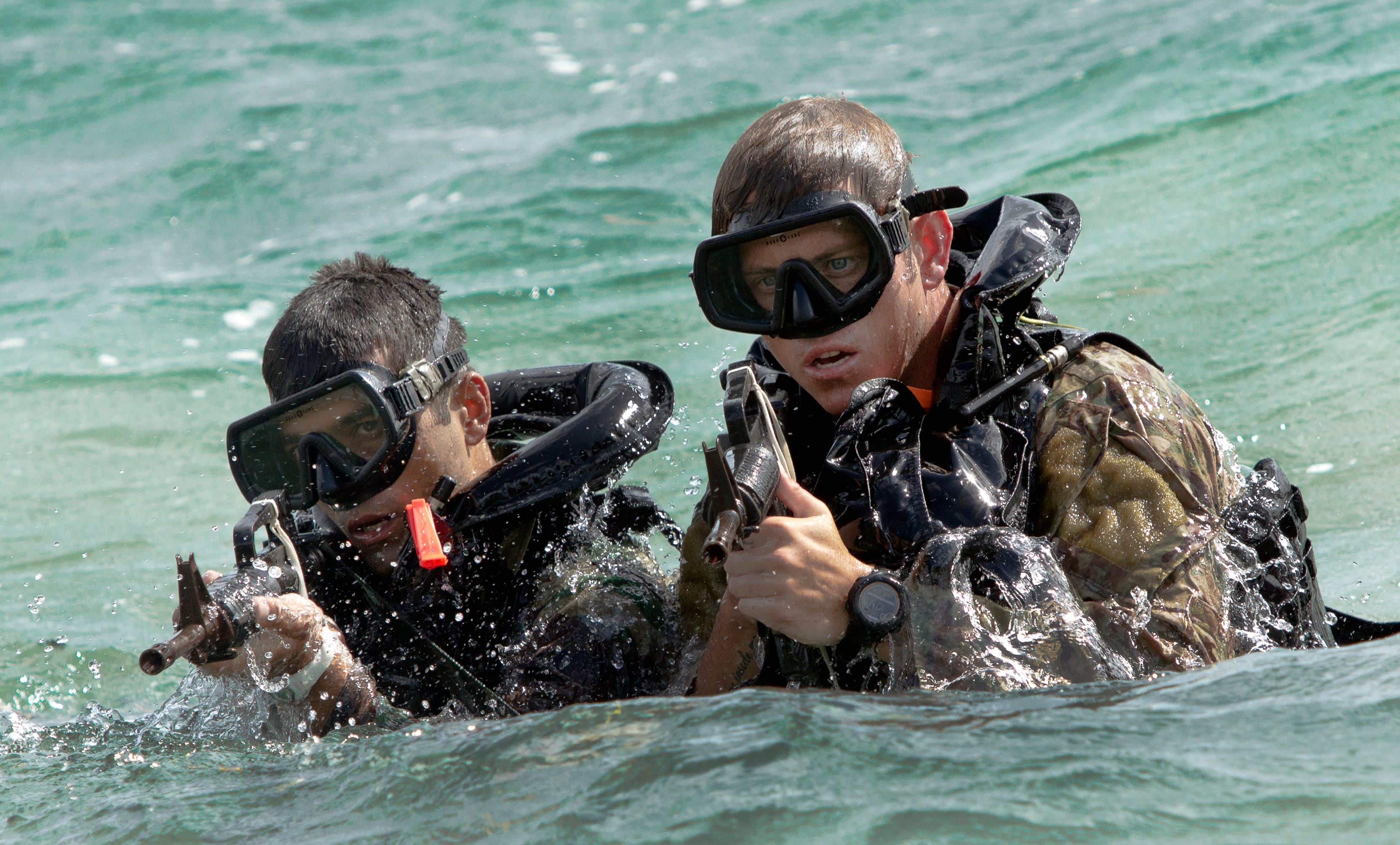
Special operations grants soldiers access to some of the military's best training, including the combat diver course.
Photo Credit: Staff Sgt. Russell Lee Klika/Army
In some instances, an officer can get a waiver, but Hetzel said those are few and far between because of the way officers' career paths are laid out.
"That's on a case-by-case basis," he said. "When I brief officers, I say do not bank on getting a waiver. They're very rare."
"If you're an individual who's extremely motivated, highly intelligent and creative, and you want to be around similar people, Army special operations is the way you want to go," said Command Sgt. Frank Gilliand, the senior enlisted soldier for the John F. Kennedy Special Warfare Center and School, which is responsible for training and growing special operations soldiers. "If you want to travel the globe, meet great people and get a sense of satisfaction that you can't find anywhere else, Army special operations is the way to go."
Some of the benefits of going special operations:
• Higher promotion rates. The average promotion rates for Special Forces, civil affairs and PSYOP soldiers from staff sergeant to sergeant first class are "more than three times greater than their conventional Army counterparts," officials said.
A recent update to the Army's enlisted promotions regulation includes a provision that specialists and corporals who successfully complete the Special Forces Qualification Course will be automatically promoted to sergeant.
In addition, sergeants who have been recommended for promotion in their previous military occupational specialty will be promoted to staff sergeant on the "first calendar day of the following month upon successful completion of all phases of the [qualification] course," according to the regulation updated Feb. 2.
• Access to some of the military's best training. Some examples of schools special operations troops attend include Survival, Evasion, Resistance and Escape School; free-fall parachute school; and the combat diver course, Hetzel said.
• Special pays and bonuses. Special operations soldiers can qualify for a variety of special pays, such as language pay, which can be worth as much as $1,000 a month, according to SORB.
Other special pays include jump pay ($150 a month), special duty assignment pay ($375 a month), demolition pay ($150 a month), dive pay ($220 a month), and High Altitude Low Opening pay ($75 a month).
• Deployment opportunities. Special operations soldiers work in 65 countries around the world. Their deployments average four to eight months at a time, so while they deploy more often, it is for shorter periods of time.
• Up to $150,000 in reenlistment bonuses. The Army is offering top-tier Selective Reenlistment Bonuses worth up to $72,000 for Special Forces, civil affairs and PSYOP soldiers. It also is offering up to $150,000 to Special Forces senior NCOs to delay their retirement.
• Path to civilian education. Successful Special Forces, civil affairs and PSYOP candidates earn 48 credit hours when they complete their qualification courses. An additional 16 credits is earned in a traditional classroom setting, giving soldiers an associate's degree from Fayetteville Technical Community College.
About 700 NCOs completed their associate's degree in 2013 and 2014; 281 of them have enrolled in a bachelor's program.
The JFKSWCS also offers a master's program through National Defense University and the Naval Post Graduate School. The program is fully funded and open to all NCOs, warrant officers and officers.
It includes a 10-month resident program at the NDU Satellite Campus on the JFKSWCS campus on Fort Bragg, North Carolina.
More than 172 soldiers have graduated from the NDU program since its inception in 2010. Almost half of those were NCOs.
• And, of course, job satisfaction. "When you enter special operations, you get to serve alongside some of the most professional officers and NCOs our Army has to offer," Hetzel said.
A 'unique calling'
During the eight years he spent in 1st Special Forces Group, Sgt. 1st Class Steven Koszarek has served six combat deployments and traveled to Southeast Asia to countries such as the Philippines, Thailand and Cambodia.
A Special Forces medic, Koszarek has had the chance to learn jungle survival and complete pack mule training with the Thais, and attend the U.S. military's free-fall parachute school.
"We get to do stuff sometimes that people pay to do, but the Army lets us train that way," Koszarek said. "We're given opportunities, if we want, to explore wilderness medicine or mountain medicine. I've had far more training opportunities, military and civilian."
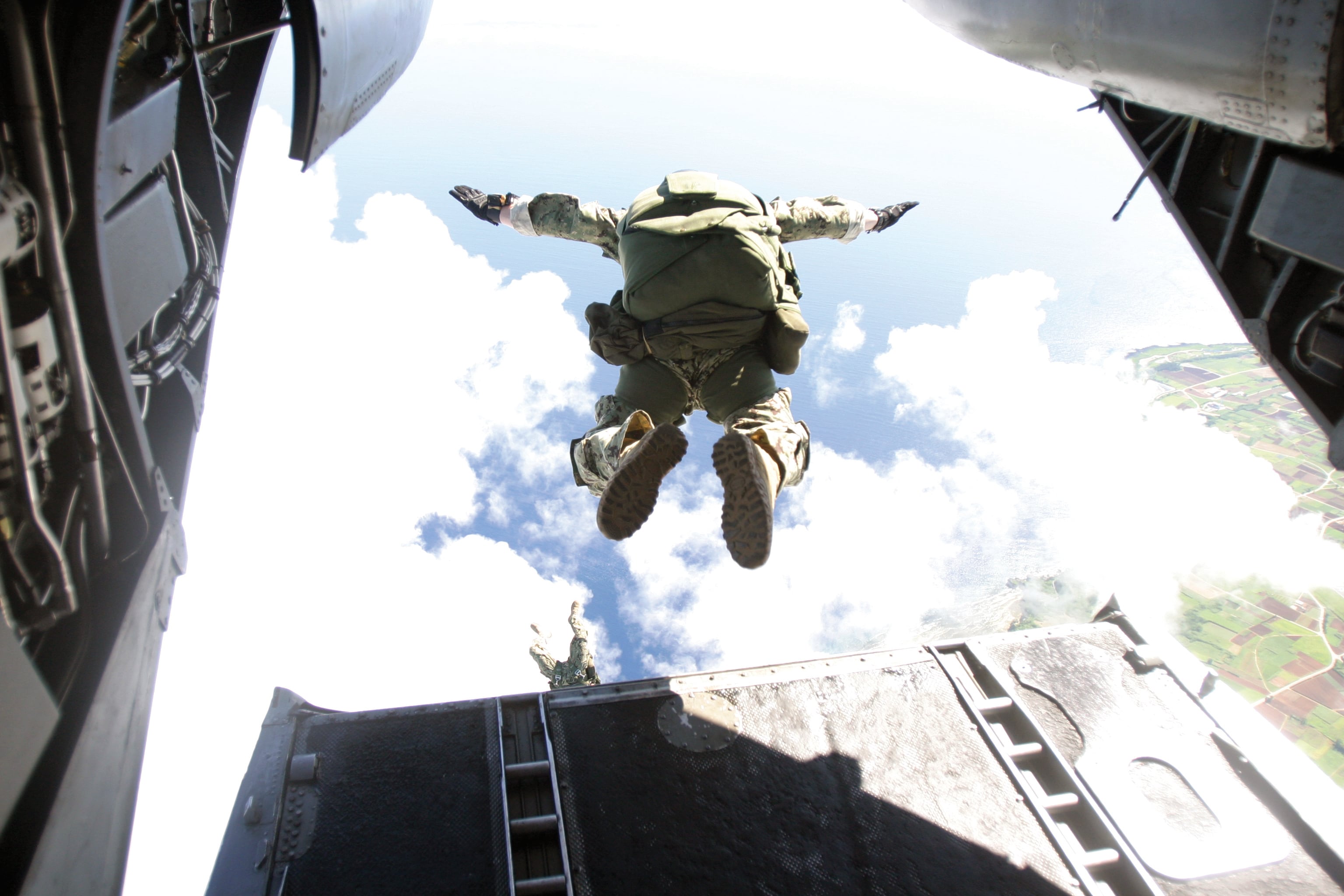
Spec ops soldiers are eligible for HALO pay.
Photo Credit: Lance Cpl. Donald Peterson/Marine Corps
Koszarek, who speaks Tagalog and Pashto, said he's also acquired a taste for Asian food, to include balut, a delicacy from the Philippines, and durian, known as the "king of fruits" in Southeast Asia.
"It's a great job," he said. "I really don't want to get out if I don't have to."
Koszarek, who is now an instructor at the JFKSWCS Noncommissioned Officer Academy, served in the Navy for six years before leaving to pursue his education. He joined the Army after the Sept. 11, 2001, attacks, hoping to contribute and make a difference.
"I didn't know how much I could contribute until I actually attempted it," Koszarek said. "And now I know, I still want to continue. It's why I stayed in. Working with the people, there are great soldiers to your left and right, it's hard to walk away from that."
His advice to aspiring special operations soldiers?
"If you're out there, all you have to do is try," he said.
Serving in special operations is a "unique calling," said Lt. Gen. Charles Cleveland, commander of U.S. Army Special Operations Command, in a statement.
"Regardless of what the future might bring, what problems might exist, we will always be able to deliver the nation with world-class, unequaled special warfare and surgical strike capabilities as long as we remain true to our first principles," he said, "to have the right people, aggregated into amazing teams, rallied behind a unique commitment to the nation."
As the Army gets smaller and as special operations veterans start leaving the service, Hetzel fears there may be "an education gap."
"You have a lot of new, young soldiers out there who just aren't aware of the opportunities special operations brings," he said. "That's one thing we're trying to educate people on. Special operations isn't for everybody, but we want to empower soldiers and leaders out there with the knowledge that a career in this profession is available to them."
Special Forces
In fiscal year 2015, the Army is looking for about 3,000 candidates to attend Special Forces Assessment and Selection, officials from the Special Operations Recruiting Battalion, or SORB, said.
Recruiters are seeking about 2,000 active-duty enlisted soldiers, 1,540 new recruits (for the 18X program), and about 400 active-duty officers.
The push for Special Forces NCOs is "our main effort" this year, Hetzel said.
"With the general drawdown in the Army, we're looking at a smaller pool of individuals," he said.
At the same time, the requirements for Special Forces is going up. The minimum General Technical score required of Special Forces candidates will increase to 110 from 107 at the end of February, Hetzel said.
On average, 37 percent of SFAS candidates will be selected to enter the Special Forces Qualification Course.
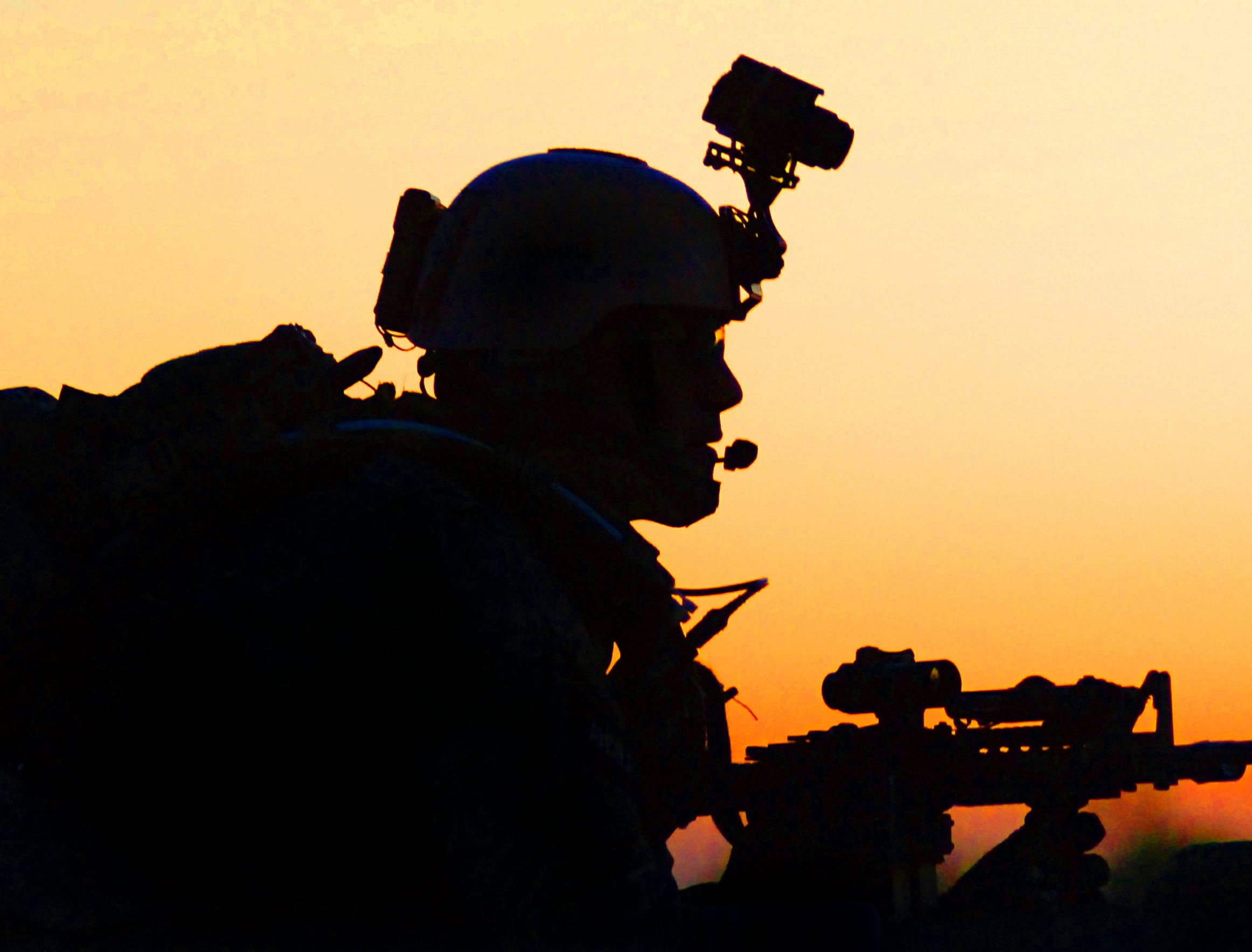
The Army has increased the GT score requirement for Special Forces from 107 to 110.
Photo Credit: Army
Among the 18X population, about 61 percent are selected to enter the qualification course.
"Some of the things we're looking for are those individuals who are intelligent, athletic, people persons who can converse or who can function in any kind of arena," said Sgt. 1st Class Wade Crumwell, a Special Forces recruiter with SORB who has served in 3rd Special Forces Group.
The Special Forces Qualification Course is 67 weeks long, except for 18D medics, who get 103 weeks of training, Gilliand said.
Among the active-duty enlisted population, only one in every eight recruits will earn the Special Forces tab, he said.
About one in five 18X recruits – these are new soldiers who first go to basic and advanced individual training and airborne school before showing up to selection – will earn the tab, Gilliand said.
"It's not as simple as the GT score or a specific score on the ASVAB," he said. "It's how well-rounded an individual is in everything they do. There are some intangibles."
Attributes such as integrity, courage, perseverance, personal responsibility, and adaptability are "core attributes we look for," said Gilliand, who is a Special Forces soldier.
Civil affairs
The SORB is looking for more than 950 candidates for the civil affairs field this year.
Of those, recruiters are seeking 737 active-duty enlisted soldiers and 225 officers.
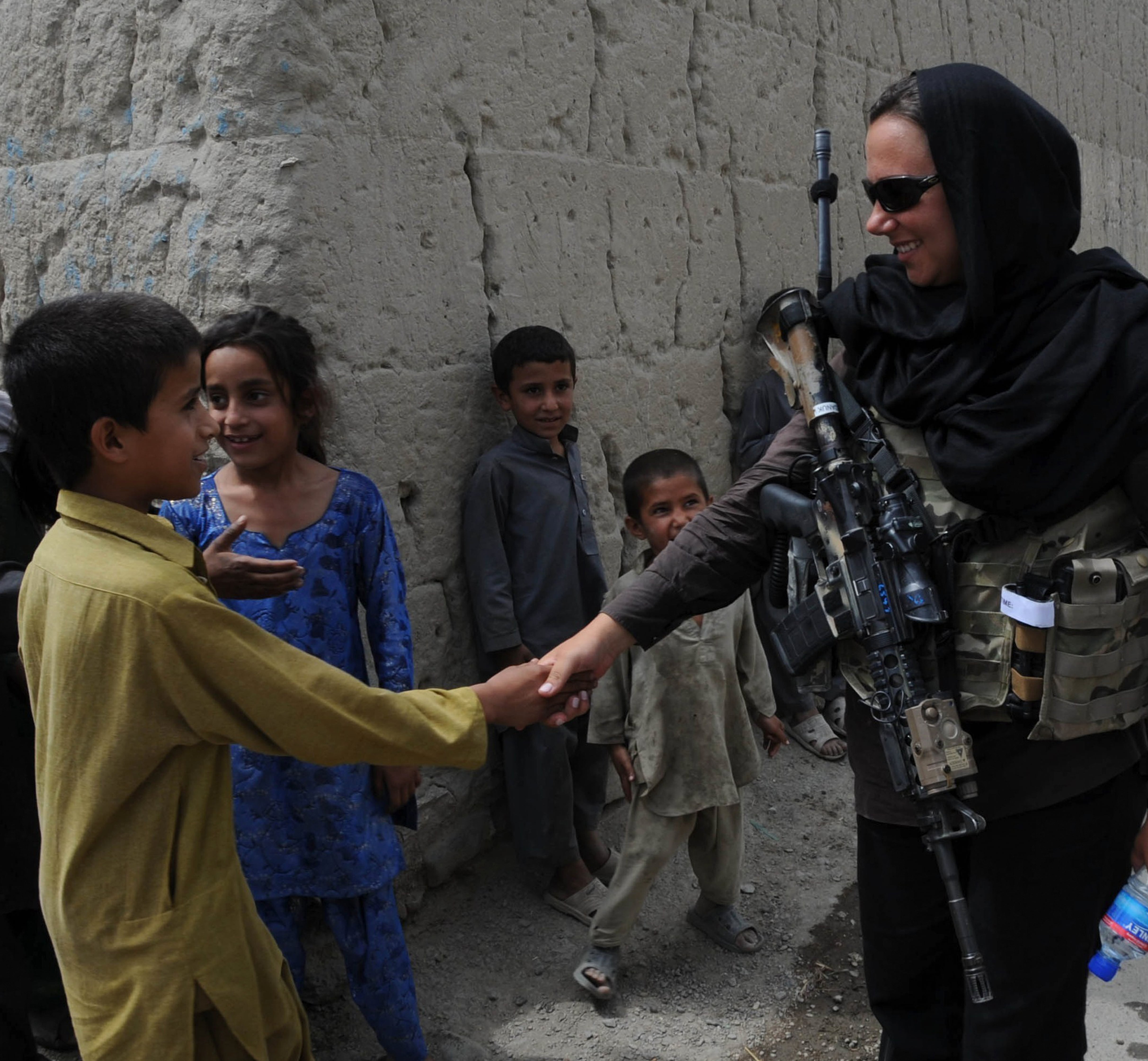
There are nearly 1,000 candidates needed for civil affairs.
Photo Credit: Army
On average, 64 percent of active-duty candidates will be selected to enter the Civil Affairs Qualification Course.
At the end of February, the Army will start requiring civil affairs candidates to have a GT score of at least 107, Hetzel said. Before, there was no requirement or minimum, he said.
The change is to "further refine the quality of soldier so you get the most professional individual from the conventional force into special operations," Hetzel said.
Civil affairs training is 46 weeks, Gilliand said. For every two recruits, one will graduate, he said.
"We maintain high standards, and when these guys walk across the state, they're proud because they've accomplished something," he said.
Psychological affairs
This year's recruiting goal for PSYOP is about 800 soldiers — 642 enlisted and 158 officers.
PSYOP also will institute a minimum GT score of 107 at the end of February.
One of the focus areas this year is to try and increase the number of female candidates, said Sgt. 1st Class Roberto Flores, a PSYOP recruiter assigned to the SORB.
"A lot of females in the military don't understand that there are special operations opportunities available to them already now," he said.
On average, 64 percent of active-duty candidates will be selected to enter the Psychological Operations Qualification Course.
Just one in every 2.5 recruits will graduate the 43-week course, Gilliand said.
Flores has served in this career field his entire career.
"We're looking at the thinking athlete, a problem-solver, someone who can think outside the box, can approach something and have a different view of it," Flores said. "We're looking for somebody who wants to join our ranks, that individual who's hungry and wants to do something different."
160th Special Operations Aviation Regiment
The 160th has soldiers serving in 97 different specialties, said Master Sgt. Tom Mattingly, the noncommissioned officer in charge of the regiment's recruiting cell.
Fifty-eight of those are enlisted MOSs and the rest are warrant officers and officers, he said.
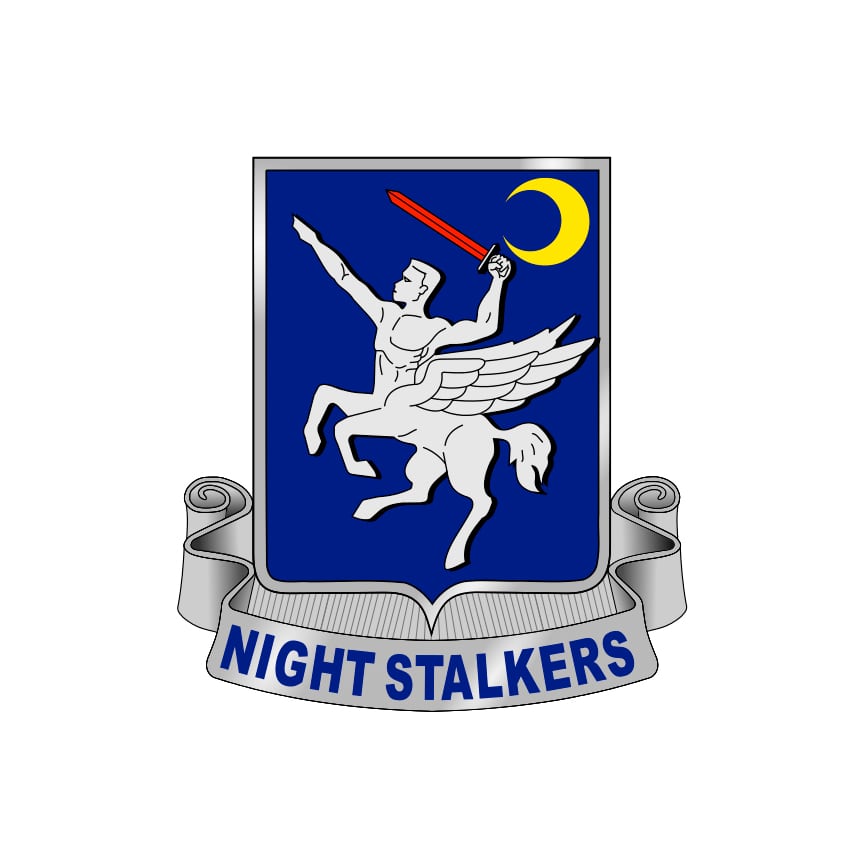
Night Stalkers insignia
Photo Credit: Army
A big challenge is awareness, Mattingly said.
"A lot of people in the support career fields don't understand how they fit into the 160th," he said. "They're an integral part of the success of our mission."
Among officers and warrant officers, the regiment is seeking pilots for the AH-6 and MH-6 Little Bird, MH-60 Black Hawk and MH-47 Chinook, he said.
The 160th also is looking for officers and warrants in specialties such as intelligence and logistics, Mattingly said.
As part of its Aviation Restructuring Initiative, the Army is eliminating the OH-58D Kiowa Warrior from its inventory. The 160th is "absolutely" looking at that population "to give them an opportunity to continue their careers in the Army," Mattingly said.
Kiowa pilots who are already offered a transition to a different airframe can still try out for the 160th, Mattingly said.
If they don't successfully qualify for the 160th, it will have "no bearing" on their initial transition, and they will be able to continue on in the conventional Army, he said.
The regiment also is seeking female officers, warrant and enlisted soldiers, Mattingly said.
So far, three female pilots have successfully qualified to fly for the regiment, and they primarily fly the MH-60.
To join the 160th, applicants must make it through Green Platoon.
Officers undergo a seven-day assessment. If selected, they attend the three-week Officer Green Platoon, Mattingly said. Aviators who successfully complete Officer Green Platoon then go on for about six more months of aviation training.
Enlisted candidates must have a GT score of 100 or higher, and they complete an administrative assessment before they are offered a chance to attend the six-week Enlisted Green Platoon.
Warrant officers who are accepted into the regiment are allowed to stay until they retire, if that's what they choose to do, Mattingly said. Officers have an initial commitment of four to six years, depending on their specialty, and it's not uncommon for enlisted soldiers in the regiment to stay for an average tenure of eight to 10 years, he said.
"It is a very unique and very exciting mission," Mattingly said.
Chief Warrant Officer 4 Raymond Smiley has served as a Night Stalker for about 21 years, first as an enlisted soldier and later as an MH-47 pilot.
"It is hands-down the best aviation unit to be in," Smiley said.
During his time with the regiment, Smiley has deployed dozens of times, including to Iraq and Afghanistan.
One of his favorite tours was early in the wars in Iraq and Afghanistan, he said.
"The people, the camaraderie, the missions, we were very, very busy then," he said.
Smiley also participated in Operation Anaconda on March 4, 2002, high up in the snowy, 10,000-foot mountains of eastern Afghanistan. The deadly Battle of Roberts Ridge cost seven American lives.
"It was very long, very intense couple days of flying," Smiley said. "I was lucky enough to not be shot down."
Smiley said he is proud of his fellow Night Stalkers and their actions during that operation.
"When you have guys on the ground, that's one of the things I love about this place, we're going to go do it," he said. "We're not going to disobey orders or go out and do cowboy stuff, but we're going to do what it takes, and we did. We got everyone off that mountain."
Smiley said he hopes to finish out his career as a Night Stalker.
"I wouldn't want to go anywhere else," he said. "I'm very fortunate to have a job that I enjoy getting up and doing every day."
Michelle Tan is the editor of Army Times and Air Force Times. She has covered the military for Military Times since 2005, and has embedded with U.S. troops in Iraq, Afghanistan, Kuwait, Haiti, Gabon and the Horn of Africa.





